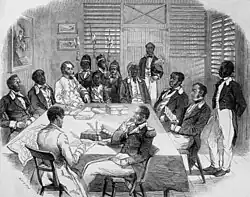Government of Mosquitia
| Supreme Local Government | |
|---|---|
 | |
| Overview | |
| State | Kingdom of Mosquitia |
| Leader | King of Mosquitia |
| Main organ | Council of State |
| Headquarters | Court House, Bidwell Street, Bluefields |
The Supreme Local Government was the principal governing authority of the Kingdom of Mosquitia between 1846 and 1861, established during the minority of King George Augustus Frederic. It was formally constituted on 10 September 1846 by royal commission, issued in the name of the king, with the advice of his legitimate advisers and the assent of the principal inhabitants. The government was structured around a central institution known as the Council of State, which functioned as both a privy council and supreme administrative authority.[1]
Although not a constitutional monarchy in the European liberal sense, the Kingdom of Mosquitia developed a quasi-parliamentary government under this arrangement, blending indigenous leadership, hereditary monarchy, and British legal-institutional influence.
Background
The Supreme Local Government was established following a transitional period governed by the Regency Commission of Mosquitia (1842–1846), which was put in place after the death of King Robert Charles Frederic. His successor, George Augustus Frederic, was still a minor and being educated in British Honduras under British oversight. The regency, initially chaired by Colonel Alexander Macdonald, Her Majesty's Superintendent in British Honduras, was later handed over to indigenous leaders, including General Thomas Lowry Robinson Jr.
As George Augustus Frederic approached majority, the necessity arose to replace the ad hoc regency with a permanent administrative structure. The Royal Commission of 10 September 1846 abolished the earlier Testamentary Deed issued in 1840, citing its informality, and established a more structured form of government.
Structure
Council of State
The Council of State functioned as the executive arm of the Supreme Local Government. Its members were appointed by the King, often with the advice of British officials and local elites. The Council was composed of:
- Honorary Councillors: often senior British or colonial clergy and military officers.
- Active Councillors: Mosquitian residents with executive or administrative responsibilities.
Notable appointees included:
- Alexander Macdonald, Colonel of the British Royal Horse Artillery.
- Matthew Newport, Rector of Saint John's, Belize.
- James Stanislaus Bell, a British agent influential in Mosquitian affairs.
- George Hodgson, a prominent local figure.
- Thomas Fox Strangways, British military officer.
The commission empowered them to act with full authority in administrative matters and to serve for renewable terms, typically one year.
Functions and Powers
The Supreme Local Government:
- Exercised executive and administrative control over national affairs.
- Oversaw foreign relations, especially with British officials and neighboring Central American states.
- Held authority to issue laws, directives, and judicial appointments.
- Maintained peace and regulated trade within the kingdom.
Although formally sovereign, the Mosquitian government functioned under British protection, and many of its policies were coordinated with or influenced by the British Superintendent in British Honduras.
Diplomatic Recognition
The Supreme Local Government was recognized by Great Britain, which maintained relations with Mosquitia as a protected state. British naval officers and consular representatives regularly communicated with the government and received official correspondence from the Council of State.
Some foreign powers, such as the United States, treated the Mosquitian Government as a de facto political entity but avoided full recognition due to regional tensions, particularly with Nicaragua, which claimed sovereignty over the territory.
Dissolution
The Supreme Local Government functioned until the events surrounding the Treaty of Managua (1860), in which the United Kingdom recognized Nicaraguan sovereignty over the Mosquito Coast, albeit with conditions ensuring autonomy for the Mosquito Reserve. Though King George Augustus Frederic accepted the treaty terms, the government's authority was gradually reduced.
Legacy
The Supreme Local Government marked a unique period in Central American history, representing an indigenous monarchy's attempt to operate a constitutional and bureaucratic government. Its structure, combining hereditary kingship with an appointed Council of State, closely mirrored institutions like the Privy Council of the United Kingdom, while reflecting local political traditions.
Although short-lived, it was a distinctive experiment in self-government, diplomacy, and legal adaptation in the context of 19th-century imperial politics.
References
- ^ Oertzen, Eleonore von; Rossbach, Lioba; Wünderich, Volker (1990). The Nicaraguan Mosquitia in Historical Documents, 1844-1927: The Dynamics of Ethnic and Regional History. D. Reimer. ISBN 978-3-496-00476-9.